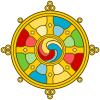Gyaincain Norbu
| Gyaincain Norbu | |||||||||
| Tibetan name | |||||||||
|---|---|---|---|---|---|---|---|---|---|
| Tibetan | ཆོས་ཀྱི་རྒྱལ་པོ་ | ||||||||
| |||||||||
| Chinese name | |||||||||
| Traditional Chinese | 堅贊諾布 | ||||||||
| Simplified Chinese | 坚赞诺布 | ||||||||
| |||||||||
| Part of a series on |
| Tibetan Buddhism |
|---|
 |
Jizün Losang Qamba Lhünzhub Qoigyijabu Baisangbu (born Gyaincain Norbu, February 13, 1990), commonly known as Qoigyijabu, is promoted by the government of The People's Republic of China as the eleventh incarnation of the Tibetan Panchen Lama. He was selected by the drawing of his name from a Golden Urn. Qoigyijabu is the son of two Communist Party members[1], which may offer insight into the reasoning behind his selection.
Another child, Gedhun Choekyi Nyima, had been previously proclaimed as the Panchen Lama using traditional means by the Dalai Lama and the Tibetan Government in Exile. Gedhun and his household forcibly disappeared immediately after publication of his selection by the Dalai Lama. According to the Chinese Government, Gedhun Choekyi Nyima and his family were placed into protective custody and were relocated to another part of China. The Tibetan Government in Exile holds that Qoigyijabu is not the genuine 11th Panchen Lama.[2]
Selection
Following the death of the 10th Panchen Lama in 1989, the search for his reincarnation quickly became mired in controversy.
The head of the Panchen Lama search committee at the time, Chadrel Rinpoche, was able to secretly communicate with the Dalai Lama. After the Dalai Lama proclaimed Gedhun Choekyi Nyima as the 11th incarnation of the Panchen Lama, Government authorities had Chadrel Rinpoche arrested and was replaced by Sengchen Lobsang Gyaltsen. Sengchen had been a political opponent of both the Dalai Lama and the 10th Panchen Lama[citation needed]. The new search committee, having disregarded the Dalai Lama's announcement, decided to choose the Panchen Lama from a list of finalists by drawing lots from a Golden Urn. This list did not include Gedhun Choekyi Nyima. The Chinese custom of using the Golden Urn, which is unrelated to the traditional religious or spiritual proceedings preferred by many Tibetan Buddhists, had been introduced in the year 1792 by the Qianlong Emperor to deal with a previous controversy.
Using the urn, six-year-old Gyancain Norbu, the son of two communist party members from Lhari was selected and proclaimed the Panchen Lama, with the religious name Erdini Qoigyijabu. He was enthroned at Tashilhunpo Monastery and has since assumed the full functions of Panchen Lama[citation needed]. He had been living in Beijing during his childhood to be educated in a Chinese way, and moved back to Tashilhunpo Monastery in Shigatse, the official seat of the Panchen Lamas. He developed altitude sickness when he first moved back, but overcame it quickly. as of 2006[update], according to the Associated Press, Qoigyijabu "is believed to live in Beijing amid intense secrecy and is almost never seen in public." He made a rare visit to Tashilhunpo in September 2006, and was invited to the World Buddhist Forum months before. However, fellow Buddhists did not acknowledge or recognize his attendance during opening ceremonies.
According to Tashi Wangdi, the Representative to the Dalai Lama, he lacks legitimacy in the eyes of the Tibetan people, who are forced to attend his ceremonies. "They can’t keep their Panchen Lama in Tibet. They tried to bring him to his monastery many times but people would not see him. How can you have a religious leader like that?"[3]
Just about the same time that Qoigyijabu turned 18, reports indicated that the Chinese government had decided that he would be elected to the Standing Committee of the National People's Congress.[4] As he was not 18 when the elections were held, Qoigyijabu was not able to gain a seat in the Standing Committee of the National People's Congress.[5]
Names
Gyaincain Norbu's full religious name is Jizün Losang Qamba Lhünzhub Qoigyijabu Baisangbu, although he is generally called Qoigyijabu. Meaning "Dharma king", this name can also be written Chökyi Gyalpo, Choekyi Gyalpo, or, in Wylie transliteration, Chos-kyi Rgyal-po. The Chinese equivalent is Quèjí Jiébù (确吉杰布).
The name Gyaincain Norbu (རྒྱལ་མཚན་ནོར་བུ་ Wylie: Rgyal-mtshan Nor-bu) can also be written Gyaencaen Norbu, Gyancain Norbu, or Gyaltsen Norbu.
External links
- China Tibet Information Center - The 11th Panchen Lama
- News article with photos on 2004 meeting between Erdini Qoigyijabu and Raidi, a high-ranking ethnic Tibetan party official. (Simplified Chinese)
- BBC News article - "Tibet's missing spiritual guide"
References
- ^ 'A Year In Tibet' Broadcasted on BBC Four on Thursday, 6 March 2008 at 2100GMT
- ^ "Struggle over Tibet's 'soul boy'". The Guardian. September 8, 2003. Retrieved 2008-06-24.
- ^ Interview with Tashi Wangdi, David Shankbone, Wikinews, November 14, 2007.
- ^ Panchen Lama to become youngest China minister - sources | Top News | Reuters
- ^ CHINA Mao's grandson enters into politics, but the Panchen Lama is put on hold in Beijing - Asia News

